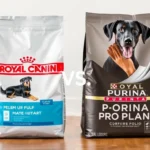
Proper dog nutrition is vital for the health and well-being of our furry friends. A balanced diet not only provides the necessary energy for playtime and daily activities but also significantly impacts their overall health and longevity. With a plethora of options available in the market, identifying the best dog foods in Canada can be overwhelming for dog owners and potential adopters alike. This guide aims to simplify the process, offering insights into essential nutrients, market trends, and recommendations for various dietary needs.
Understanding Dog Nutrition
Key Nutrients for Dogs
To keep your dog healthy, it’s essential to understand the key nutrients they require:
-
Proteins: Proteins are the building blocks of a dog’s body, crucial for growth, maintenance, and repair of tissues. High-quality protein sources include chicken, beef, fish, and eggs.
-
Fats: Fats are a concentrated source of energy and play a critical role in maintaining a healthy coat and skin. Omega fatty acids, particularly Omega-3 and Omega-6, are vital for reducing inflammation and promoting skin health.
-
Carbohydrates: While dogs primarily require proteins and fats, carbohydrates serve as an important energy source and aid in digestion. Whole grains, fruits, and vegetables can provide essential fiber.
-
Vitamins and Minerals: These are necessary for various bodily functions, including immunity and bone health. Key vitamins include A, D, E, and B-complex vitamins, while minerals like calcium, phosphorus, and potassium are vital for overall health.
Life Stages and Nutritional Needs
Different life stages require different nutritional approaches:
-
Puppies: Growing puppies have higher protein and calorie requirements to support their rapid growth and development. Look for puppy-specific formulas rich in protein and DHA for brain development.
-
Adult Dogs: Adult dogs need a balanced diet focused on maintaining energy levels and overall health. A diet with moderate fat and protein levels is ideal.
-
Senior Dogs: As dogs age, their metabolism slows down. Senior dog formulas are typically lower in calories but enriched with joint-supporting supplements like glucosamine and chondroitin.
Special Dietary Needs
Some dogs may have specific dietary requirements due to health conditions or lifestyle:
-
Food Allergies and Intolerances: Dogs can be allergic to certain proteins or grains. It’s important to identify allergens and choose hypoallergenic dog foods.
-
Health Conditions: Dogs with diabetes or obesity may require specialized diets low in carbohydrates and calories.
-
Working vs. Non-Working Dogs: Active dogs need higher protein and fat content to fuel their activities, while non-working dogs may require a more balanced diet to prevent obesity.
The Canadian Dog Food Market
Overview of the Market
The dog food industry in Canada is robust, reflecting the increasing pet ownership trend. Canadians are becoming more conscious of pet nutrition, leading to a rise in demand for high-quality, premium dog foods. The market includes a variety of options ranging from dry kibble to raw diets.
Types of Dog Food Available
Dog food comes in various formats:
-
Dry Kibble vs. Wet Food: Kibble is convenient and helps with dental health, while wet food typically contains more moisture and can be more palatable.
-
Raw and Homemade Diets: Some pet owners opt for raw diets or homemade meals, believing these provide fresher, more natural ingredients. However, careful planning is required to ensure a balanced diet.
-
Specialized Diets: Grain-free, organic, and limited-ingredient diets are gaining popularity, especially among dogs with sensitivities.
Regulatory Standards
In Canada, the Canadian Food Inspection Agency (CFIA) regulates pet food. It ensures that dog foods meet specific nutritional standards and labeling requirements, providing consumers with confidence in the products they purchase.
Criteria for Choosing the Best Dog Foods in Canada
Ingredient Quality
When selecting dog food, prioritize quality ingredients:
-
Whole Ingredients vs. Fillers: Look for foods with whole, recognizable ingredients rather than fillers like corn and soy, which offer little nutritional value.
-
Importance of Meat Sources: High-quality protein sources should be listed as the first ingredient. Avoid foods with vague terms like “meat by-products.”
Brand Reputation
Assessing a brand’s reputation can guide your decision:
-
Brand History and Customer Reviews: Researching a brand’s history and customer feedback can provide insights into its reliability and quality.
-
Certifications and Endorsements: Look for brands with endorsements from veterinary associations or those that adhere to AAFCO standards.
Nutritional Adequacy
Understanding nutritional adequacy is crucial:
-
Understanding AAFCO Standards: The Association of American Feed Control Officials (AAFCO) sets nutritional standards for pet foods. Look for labels indicating the food meets these standards.
-
Reading Dog Food Labels: Familiarize yourself with the ingredients list and guaranteed analysis to ensure the food meets your dog’s specific nutritional needs.
Cost vs. Quality
Finding the right balance between cost and quality is essential:
-
Evaluating Price Points: Higher-quality dog foods may come with a higher price tag, but they often provide better nutrition. Consider the long-term benefits of investing in quality nutrition.
-
Long-Term Value: A healthy diet can lead to fewer vet visits and a longer life, making quality food a worthwhile investment.
Top Recommended Dog Foods in Canada
Best Dry Dog Foods
- Orijen
- Overview: Orijen is known for its biologically appropriate formulas, featuring high protein content from fresh, regional ingredients.
- Key Ingredients: Free-run chicken, wild-caught fish, and whole eggs.
- Pros: High protein, no fillers, and grain-free.
-
Cons: Premium price point.
-
Acana
- Overview: Acana offers a range of high-quality, regionally sourced dog foods with a focus on fresh ingredients.
- Key Ingredients: Free-range poultry, whole fish, and fruits.
- Pros: High-quality ingredients and multiple flavor options.
-
Cons: Some formulas may be higher in fat.
-
Royal Canin
- Overview: Royal Canin provides breed-specific and life stage-specific formulas tailored to individual needs.
- Key Ingredients: Chicken meal, corn, and rice.
- Pros: Tailored nutrition and veterinary approval.
- Cons: Some may prefer a grain-free diet.
Best Wet Dog Foods
- Wellness CORE Grain-Free
- Overview: This wet food is high in protein and grain-free, making it suitable for dogs with sensitivities.
- Key Ingredients: Turkey, chicken, and vegetables.
- Pros: High protein content and no fillers.
-
Cons: May be pricier than other wet foods.
-
Blue Buffalo Homestyle Recipe
- Overview: Blue Buffalo provides a homestyle recipe that combines quality ingredients in a savory sauce.
- Key Ingredients: Real chicken, carrots, and peas.
- Pros: Natural ingredients and no artificial preservatives.
-
Cons: Some dogs may prefer drier textures.
-
Hill’s Science Diet
- Overview: Hill’s Science Diet focuses on science-backed nutrition, offering various options for different life stages and health needs.
- Key Ingredients: Chicken, pork liver, and brown rice.
- Pros: Vet-recommended and tailored to specific needs.
- Cons: May not appeal to all dogs.
Best Grain-Free Options
- Taste of the Wild
- Overview: This brand is known for its grain-free formulas inspired by a dog’s ancestral diet.
- Key Ingredients: Roasted bison, roasted venison, and peas.
- Pros: High protein and unique protein sources.
-
Cons: Some dogs may not digest certain proteins well.
-
Merrick Grain-Free Texas Beef & Sweet Potato
- Overview: Merrick focuses on high-quality, locally sourced ingredients with a grain-free option.
- Key Ingredients: Beef, sweet potatoes, and blueberries.
- Pros: High meat content and balanced nutrition.
-
Cons: May be too rich for some dogs.
-
Canidae PURE Limited Ingredient
- Overview: Canidae offers limited ingredient diets that are perfect for dogs with food sensitivities.
- Key Ingredients: Fresh meat, peas, and sweet potatoes.
- Pros: Few ingredients and high digestibility.
- Cons: Limited flavor options.
Best for Specific Needs
- Best for Puppies: Royal Canin Puppy Food – Tailored for growth and development with essential nutrients.
- Best for Senior Dogs: Hill’s Science Diet Senior – Formulated to support aging dogs with specific nutritional needs.
- Best for Dogs with Allergies: Blue Buffalo Basics – Limited ingredient diet designed for dogs with food sensitivities.
Transitioning Your Dog to a New Diet
Importance of Gradual Transition
Changing your dog’s diet suddenly can lead to gastrointestinal upset. A gradual transition is essential:
- Recommended Transition Timeline: Introduce new food over a week, gradually increasing the proportion of the new food while decreasing the old.
Signs of Dietary Issues
Be mindful of how your dog responds to new food:
- Allergic Reactions: Symptoms like itching, redness, or gastrointestinal upset may indicate an allergy.
- Digestive Problems: Vomiting or diarrhea can signal that the new food isn’t suitable.
- Behavioral Changes: Changes in energy levels or behavior can also reflect dietary issues.
Consulting with a Veterinarian
Before making significant dietary changes, consult your veterinarian:
- Importance of Vet Advice: They can provide personalized recommendations based on your dog’s health and dietary needs.
- Regular Health Check-Ups: Monitoring your dog’s health regularly can help track how dietary changes impact their well-being.
Additional Tips for Dog Nutrition
Homemade Dog Food
Creating homemade meals can be beneficial, but it requires careful planning:
- Pros and Cons: Homemade diets can provide high-quality ingredients but may lack essential nutrients if not balanced correctly.
- Key Ingredients to Include or Avoid: Include lean meats and vegetables, but avoid toxic foods like onions and chocolate.
Supplements
Supplements can play a role in your dog’s nutrition:
- When to Consider Supplements: If your dog has specific health issues or dietary deficiencies.
- Types of Supplements Available: Common supplements include Omega fatty acids, glucosamine, and probiotics.
The Importance of Hydration
Don’t overlook hydration:
- Water Needs for Dogs: Ensure your dog has access to fresh water at all times.
- Impact of Hydration on Health: Proper hydration supports digestion, joint health, and overall well-being.
Conclusion
Understanding dog nutrition is crucial for ensuring your canine companion lives a healthy, happy life. By researching and selecting the best dog foods in Canada, dog owners can cater to their pets’ specific needs, whether they’re puppies, adults, or seniors. Each dog is unique, so take the time to assess their nutritional requirements and consult with a veterinarian to make informed decisions. Your furry friend deserves the best!









